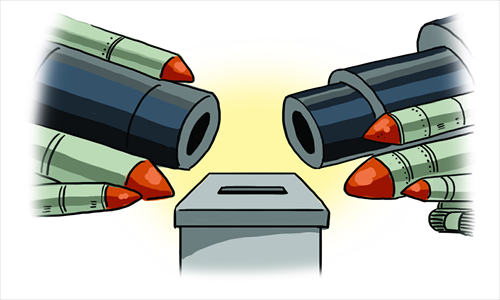Crimea shows force matters more than referendums on the ground

Illustration: Liu Rui/GT
With all ballots counted, an overwhelming 96.77 percent of voters supported Crimea joining Russia in Sunday's referendum. Soon, Russian President Vladimir Putin signed a decree, recognizing Crimea as a sovereign and independent state, and also inked a treaty to integrate Crimea into Russia on Tuesday. The situation in Ukraine is still changeable, but Crimea's return to Russia seems irretrievable.
In this whole event, an interesting contrast has caught world attention: Crimea and Kosovo.
Russia supporting and facilitating Crimea, then a region of Ukraine, to hold a referendum on its status was strongly opposed by the West, which demanded Russia respect Ukraine's sovereign integrity. But things were the other way around when Kosovo declared independence six years ago, when the West called for the respect to Kosovo's right of self-determination, but Russia insisted that Serbia's territorial integrity should be protected. The caprice of the Western countries offers Putin an excuse to remind the West that the problem of Crimea must be addressed in the same way as Kosovo.
In fact, both the West and Russia are taking advantage of the internationally recognized principles concerning sovereignty and referendum in a utilitarian manner.
When the West shifted their eyes from Kosovo to Crimea, it did not hesitate to divert the spotlight from human rights and referendums to sovereignty and territorial integrity.
Russia is employing the same approach, and it could be conjectured that if Chechnya asked for independence through a referendum, Putin, who supported Crimea's right of self-determination, would stick to his old toolbox and let the principles of sovereignty and territorial integrity get an upper hand.
These seemingly controversial plays are being performed more often on the stage of international politics. Rather than condemning the hypocrisy of these countries, we might as well recognize the reality that it exists not only in the Crimea crisis, but also in the whole field of international politics: Power struggles instead of referendums are the decisive element that controls the fate of a region or a state.
Crimea's new status has mainly resulted from Russia's involvement. And Russia's support is prevailing over the West's opposition because Russia's national strength is far greater than Ukraine's. Ukraine has the West on its side, but these Western countries are never willing to take the risks of engaging in a war with Russia, which has the second largest nuclear stockpile in the world.
It is not the ballots of Crimean residents that decide the fate of this region, it is Russia's warships, jet fighters and missiles.
From another perspective, Russia's successful incorporation of Crimea could not be done without their close cultural and historical relations. Crimea was part of Russia before the former Soviet Union leader Nikita Khrushchev gave this peninsula to Ukraine as a gesture of goodwill. Most Crimean residents speak Russian, and half of its population are of Russian origin.
Without these historical and cultural connections, Putin's moves would have lost their claim to justice. But what really matters to Russia is how to maneuver its power.
In 1992, Crimea declared independence. But without Russia's firm support, it finally became an autonomous republic within Ukraine.
Referendum is only the appearance, and power makes the call. Ballot is the cause, while warships are the key.
This is not a positive picture to many people, but it has to be admitted that this is the reality of the world politics. Referendum and respect of sovereignty have descended to tools that are manipulated by both the West and Russia for their own interests.
The right of national self-determination is widely recognized in theory, but it has been interpreted into various versions in application. This controversy has probably become irresolvable in the eyes of these theorists.
It is unnecessary to give too much attention on whether Crimea has established a new paradigm in international politics.
The power struggle among nations is still the guide for the world to explore international political events and referendums are nothing but a weapon they keep using.
The author is an associate research fellow at the Institute of International Relations, Shanghai Academy of Social Sciences. opinion@globaltimes.com.cn
Read more in Special Coverage: